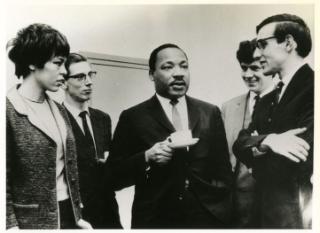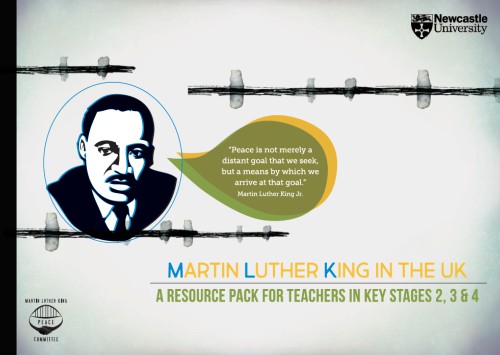Martin Luther King: radical Christian peacemaker, not secular hero
It's the 50th anniversary of Martin Luther King's visit to Newcastle University. Current university chaplain and lecturer Nick Megoran argues that all King stood for was rooted in his radical Christian faith that built on a Baptist tradition of non-violence. If we really want to honour King’s legacy, Christians in general and Baptists in particular ought to recommit to this tradition in the 21st.
A King in the North East
On this day 50 years ago Baptist minister the Revd Dr Martin Luther King Jr visited Newcastle University to receive an honorary degree. The story behind this remarkable occasion is being recalled in a series of events today. But for Baptists in particular it is worth remembering because of the challenge it leaves us: to be the type of radical peacemaker our fellow-Baptist, Dr King, wanted the church to be.

In November 1967 King made his gruelling 48-hour trip to the UK to the city of Newcastle-upon-Tyne. During the degree ceremony, King was presented to the University’s Chancellor as “Christian pastor and social revolutionary.” Following this, he made a moving, off-the-cuff acceptance speech in which he identified racism, poverty and war as the three “great and grave problems that pervade our world.” Poignantly, this was to prove his last trip outside the Americas: five months later, the world was shocked at his murder. This historic visit was almost forgotten until lost video footage of the ceremony and his impromptu acceptance speech was found in the university archives decades later.
The all-American secular hero?
In the popular imagination, King is portrayed as a great ‘civil rights leader,’ a harmless dreamer and respectable national hero who helped the USA fulfil its historical destiny of equal rights. He has been reduced to being the deliverer of inspirational soundbites about a colour-blind America from his ‘I have a dream’ speech, forever standing in front of an adoring crowd on the steps of the Lincoln Memorial in 1963. Yet this popular portrayal is misleading, for two reasons.
Firstly, King was never universally loved – especially not by the powerful segments of white US society who benefitted from the privileges racism, poverty and war afforded them. A few months before his Newcastle visit, King had publicly spoken out strongly against the Vietnam War, describing his own government as “the greatest purveyor of violence in the world today.” Already harassed by the FBI and excoriated by many whites as unpatriotic, now some of his closest black allies publicly accused him of a tactical mistake in following his conscience rather than focussing on voter rights. After returning from Newcastle, he wrote a thank-you letter to the Chancellor saying that the honorary degree was an encouragement in the face of the “constant criticism and malignment” he faced. As his murder soon afterwards was to show, he was not exaggerating.
Secondly, the popular view of King as an all-American, secular hero delivering bland truisms about dreams of a united humanity is misleading because all King stood for and did was rooted in his radical Christian faith. Some observers have missed this, because King was a master public theologian, adept at conveying particular Christian truths in a universal language. But his core concepts about human suffering and abuse (evil) and the correct response to them were thoroughly Christian.
For King, nonviolent resistance to evil was not a strategy, but a way of life “based on the conviction that the universe is on the side of justice,” as he wrote elsewhere. This was grounded in the knowledge that we have “cosmic companionship,” a belief rooted in the reality of the Resurrection which shows that “God is on the side of truth and justice.” For King, racism, poverty and war were wrong because they deformed or destroyed human beings made in God’s image. He believed that it was more important to do and say what was right before God, than what was politically expedient.
King’s Baptist predecessors
King opposed the violence of poverty, racism and war, then, not because he was a good liberal, but because he was a good theologian. In our present-day war-wracked world, Baptists (and other Christians) can best honour King’s legacy by following his rejection of war and by emulating his commitment to peacemaking.
This shouldn’t come as anything new. If Martin Luther King was the towering Baptist figure of the 20th century, then Charles Haddon Spurgeon – ‘The Prince of Preachers' – was arguably that of the 19th. Although the two pastors differed on various doctrinal issues, Spurgeon anticipated King in regard to violence. Spurgeon abhorred war, decrying it as “the sum of all villanies.” Just as King opposed US foreign policy, Spurgeon was an implacable and vocal opponent of British imperialism and militarism all his life. Albert Meredith observes that his theological principles ensured that “he never failed to be appalled at the shocking spectacle of nations resorting to arms and seeking to destroy one another” and that he “never failed to condemn the outbreak of hostilities. There was not a single instance in which he supported violence or warfare.”[1] He also disapproved of Christians following the military profession.
But Spurgeon was no mere critic of war: he passionately believed that “Only let the gospel be preached and there shall be an end of war,” and thus dedicated his life to preaching the gospel and building the church as an alternative. Whereas the world wages war, Spurgeon argued, the authentic task of the church is rather to “evangelise the masses, carry the truth of the loving God to their homes, preach Jesus and his dying love in their streets, and gather men to his fold,” because soul-saving aims a blow at the root of the war-spirit.[2] Like King, he believed the good news of the gospel inevitably spelt the ultimate end to war: “Earth wants a peacemaker,” he cried, “and it is he, Jesus of Nazareth, the King of the Jews, and the friend of Gentiles, the Prince of Peace, who will make war to cease unto the ends of the earth.”
Honouring King today
In the 17th century John Smyth, founder of the first Baptist church in Britain, formulated a winsome confession of faith that called on Christians to follow Jesus’ “unarmed and unweaponed life.”[3] In the 19th century, C.H. Spurgeon reiterated this position in evangelical terms, and in the 20th Martin Luther King Jr built it into a powerful theory and practice of political change. Yet, too often, Baptist churches have encouraged their young to join the military and have even supported wars of their host states. If we really want to honour King’s legacy, Christians in general and Baptists in particular ought to recommit to it in the 21st.
Nick Megoran is a Lecturer and honorary chaplain at Newcastle University, co-convenor of the Martin Luther King Peace Committee, and a member of the Baptist World Alliance’s Commission on Peace and Reconciliation.
[1]. Meredith, “The Social and Political Views of Charles Haddon Spurgeon,” 92.
[2]. Nettles, Living by Revealed Truth: The Life and Pastoral Theology of Charles Haddon Spurgeon, 500-01.
[3]. Dekar, For the Healing of the Nations: Baptist Peacemakers, 21.
Picture | Newcastle University

Baptist Times, 13/11/2017